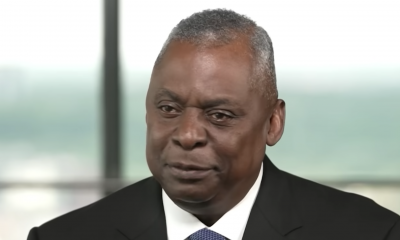National
Locals rally around Murphy
D.C. gays plan Pa. trip to help champion of ‘Don’t Ask’ repeal


U.S. Rep. Patrick Murphy, lead House sponsor of ‘Don’t Ask, Don’t Tell’ repeal, trails his GOP opponent by 14 points in a recent poll. (Washington Blade file photo by Michael Key)
Local LGBT Democratic activists are making plans to travel to Pennsylvania to help the champion of “Don’t Ask, Don’t Tell” repeal in the U.S. House in a challenging re-election campaign.
The National Stonewall Democrats and D.C.’s Gertrude Stein Democratic Club are collaborating in an effort dubbed “Stein Storm” to bring local supporters of U.S. Rep. Patrick Murphy (D-Pa.) to his district to help with his campaign.
The organizations plan to bus Murphy supporters from D.C. to Pennsylvania’s 8th congressional district on the weekends of Oct. 15 and Oct. 22.
Linsey Pecikonis, a Stonewall spokesperson, said Murphy’s leadership on “Don’t Ask, Don’t Tell” repeal makes him one of the “strongest heroes here in the LGBT community.”
“Right now when we’re struggling as a community to have our voice represented in Congress, we can’t lose our heroes,” she said. “And so, the LGBT community needs to come out and show support for our strongest allies and Patrick Murphy is one of those.”
Murphy, who’s straight, has been praised by LGBT advocacy groups for taking the lead in repealing “Don’t Ask, Don’t Tell” in the House.
An Iraq war veteran, Murphy assumed sponsorship last year of legislation that would repeal the statute when the bill had about 150 co-sponsors and gradually built support for the measure.
In May, Murphy introduced an amendment to major defense budget legislation that would lead to repeal of “Don’t Ask, Don’t Tell.” The measure passed, 234-194.
Jeffrey Richardson, president of the Stein Club, said his organization is planning to assist Murphy because of this work on “Don’t Ask, Don’t Tell.”
“We don’t have a lot of allies — particularly on the national level — these days, so when you have a strong ally like Rep. Murphy, we as a community have to stand up and do all that we can,” Richardson said. “We can’t sit on the sidelines.”
Although Richardson said he doesn’t have a final count on the number of local supporters who will travel from D.C. to help with Murphy’s campaign, he said he already has the commitment of about 10 to 15 volunteers.
Planned activities include phone banking and canvassing the district as well as giving Murphy more visibility in upcoming rallies planned in Pennsylvania.
Stonewall’s efforts go beyond helping to transport people from the D.C. area to Murphy’s district. The organization has one paid organizer working with the Murphy campaign to help with his re-election.
Additionally, Pecikonis said all Stonewall staffers will be spending time in Murphy’s district.
Murphy is among 12 Democratic candidates that Stonewall has endorsed as part of its “Elect Equality” initiative. Others in this group include Rep. Carol Shea-Porter (D-N.H.), who’s facing a difficult re-election campaign, and Ed Potosnak, a gay schoolteacher who’s seeking to unseat Rep. Leonard Lance (R-N.J.).
In a statement, Murphy said, “it’s been a honor” to have the support of LGBT people and to “work with them to advance pro-equality legislation and lead the fight to repeal the military’s discriminatory and outdated ‘Don’t Ask, Don’t Tell’ policy.”
“When I served in Baghdad as a paratrooper in the 82nd Airborne, we didn’t care about the sexual orientation of the guy next to us, but rather whether he could do his job,” he said.
Murphy is facing a challenging re-election campaign. He’s running in what pundits expect to be a Republican year and against a GOP candidate he narrowly unseated in 2006 during a surge in Democratic popularity.
Mike Fitzpatrick, now an attorney, is challenging Murphy to regain the House seat he once held. Murphy defeated Fitzpatrick in 2006 by less than one percentage point.
Pecikonis warned that Republicans view Pennsylvania’s 8th congressional district as a potential pickup and are devoting considerable efforts to defeat Murphy.
“We see that Republicans feel that his seat is one of the most vulnerable seats in the House and they’re dumping millions of dollars into his opponent’s campaign,” she said.
Fitzpatrick opposes “Don’t Ask, Don’t Tell” repeal, according to the Bucks County Courier Times.
In response to an inquiry about the Senate’s recent failure to move forward with legislation that would end the law, Darren Smith, a Fitzpatrick spokesperson, was quoted as saying Democrats were forcing the issue too soon by not waiting for the completion of a Pentagon study due Dec. 1.
“What Congress has essentially done here is prejudged the outcome of that study,” Smith reportedly said. “If we ask the military to figure something out, why are [Senate Democrats and the White House] taking action now?”
Murphy said Fitzpatrick once held the view that “Don’t Ask, Don’t Tell” should be repealed and criticized him for what he said was changing his position on the issue.
“As far as I’m concerned, every day that goes by with this policy still in place is a disservice to all our troops and harms our national security,” he said.
Recent polling data confirms that Murphy won’t have an easy path to re-election this year. A poll published last month by Franklin & Marshall College found that he trails Fitzpatrick by 14 points among likely voters in the district.
The poll is based on phone interviews conducted between Sept. 14-19. The margin of error is plus or minus 4.5 percentage points.
But Murphy dismissed the poll and noted the same dire predictions were made by the same polling firm in the days before he defeated Fitzpatrick in 2006.
“Some polls have me up, others down,” Murphy said. “This was always going to be a tough race and I’m taking nothing for granted. National pundits like the Cook Report have cited my leadership on [‘Don’t Ask, Don’t Tell’] repeal as the reason I’m in a tough fight, but I don’t give a damn what they say — what’s right is right.”
Richardson said the poll is “concerning” but also called the numbers a “rallying cry” for Murphy supporters.
“The reality is we can’t sit on the sidelines and just sort of sit back and say, ‘Well, he’s down in the polls. Well, OK,'” Richardson said. “We have to step it up and put our boots on the ground and try to do all that we can to get him back in Congress.”
U.S. Supreme Court
Supreme Court to consider bans on trans athletes in school sports
27 states have passed laws limiting participation in athletics programs

The U.S. Supreme Court on Thursday agreed to hear two cases involving transgender youth challenging bans prohibiting them from participating in school sports.
In Little v. Hecox, plaintiffs represented by the ACLU, Legal Voice, and the law firm Cooley are challenging Idaho’s 2020 ban, which requires sex testing to adjudicate questions of an athlete’s eligibility.
The 9th U.S. Circuit Court of Appeals described the process in a 2023 decision halting the policy’s enforcement pending an outcome in the litigation. The “sex dispute verification process, whereby any individual can ‘dispute’ the sex of any female student athlete in the state of Idaho,” the court wrote, would “require her to undergo intrusive medical procedures to verify her sex, including gynecological exams.”
In West Virginia v. B.P.J., Lambda Legal, the ACLU, the ACLU of West Virginia, and Cooley are representing a trans middle school student challenging the Mountain State’s 2021 ban on trans athletes.
The plaintiff was participating in cross country when the law was passed, taking puberty blockers that would have significantly reduced the chances that she could have a physiological advantage over cisgender peers.
“Like any other educational program, school athletic programs should be accessible for everyone regardless of their sex or transgender status,” said Joshua Block, senior counsel for the ACLU’s LGBTQ and HIV Project. “Trans kids play sports for the same reasons their peers do — to learn perseverance, dedication, teamwork, and to simply have fun with their friends,” Block said.
He added, “Categorically excluding kids from school sports just because they are transgender will only make our schools less safe and more hurtful places for all youth. We believe the lower courts were right to block these discriminatory laws, and we will continue to defend the freedom of all kids to play.”
“Our client just wants to play sports with her friends and peers,” said Lambda Legal Senior Counsel Tara Borelli. “Everyone understands the value of participating in team athletics, for fitness, leadership, socialization, and myriad other benefits.”
Borelli continued, “The U.S. Court of Appeals for the Fourth Circuit last April issued a thoughtful and thorough ruling allowing B.P.J. to continue participating in track events. That well-reasoned decision should stand the test of time, and we stand ready to defend it.”
Shortly after taking control of both legislative chambers, Republican members of Congress tried — unsuccessfully — to pass a national ban like those now enforced in 27 states since 2020.
Federal Government
UPenn erases Lia Thomas’s records as part of settlement with White House
University agreed to ban trans women from women’s sports teams

In a settlement with the Trump-Vance administration announced on Tuesday, the University of Pennsylvania will ban transgender athletes from competing and erase swimming records set by transgender former student Lia Thomas.
The U.S. Department of Education’s Office for Civil Rights found the university in violation of Title IX, the federal rights law barring sex based discrimination in educational institutions, by “permitting males to compete in women’s intercollegiate athletics and to occupy women-only intimate facilities.”
The statement issued by University of Pennsylvania President J. Larry Jameson highlighted how the law’s interpretation was changed substantially under President Donald Trump’s second term.
“The Department of Education OCR investigated the participation of one transgender athlete on the women’s swimming team three years ago, during the 2021-2022 swim season,” he wrote. “At that time, Penn was in compliance with NCAA eligibility rules and Title IX as then interpreted.”
Jameson continued, “Penn has always followed — and continues to follow — Title IX and the applicable policy of the NCAA regarding transgender athletes. NCAA eligibility rules changed in February 2025 with Executive Orders 14168 and 14201 and Penn will continue to adhere to these new rules.”
Writing that “we acknowledge that some student-athletes were disadvantaged by these rules” in place while Thomas was allowed to compete, the university president added, “We recognize this and will apologize to those who experienced a competitive disadvantage or experienced anxiety because of the policies in effect at the time.”
“Today’s resolution agreement with UPenn is yet another example of the Trump effect in action,” Education Secretary Linda McMahon said in a statement. “Thanks to the leadership of President Trump, UPenn has agreed both to apologize for its past Title IX violations and to ensure that women’s sports are protected at the university for future generations of female athletes.”
Under former President Joe Biden, the department’s Office of Civil Rights sought to protect against anti-LGBTQ discrimination in education, bringing investigations and enforcement actions in cases where school officials might, for example, require trans students to use restrooms and facilities consistent with their birth sex or fail to respond to peer harassment over their gender identity.
Much of the legal reasoning behind the Biden-Harris administration’s positions extended from the 2020 U.S. Supreme Court case Bostock v. Clayton County, which found that sex-based discrimination includes that which is based on sexual orientation or gender identity under Title VII rules covering employment practices.
The Trump-Vance administration last week put the state of California on notice that its trans athlete policies were, or once were, in violation of Title IX, which comes amid the ongoing battle with Maine over the same issue.
New York
Two teens shot steps from Stonewall Inn after NYC Pride parade
One of the victims remains in critical condition

On Sunday night, following the annual NYC Pride March, two girls were shot in Sheridan Square, feet away from the historic Stonewall Inn.
According to an NYPD report, the two girls, aged 16 and 17, were shot around 10:15 p.m. as Pride festivities began to wind down. The 16-year-old was struck in the head and, according to police sources, is said to be in critical condition, while the 17-year-old was said to be in stable condition.
The Washington Blade confirmed with the NYPD the details from the police reports and learned no arrests had been made as of noon Monday.
The shooting took place in the Greenwich Village neighborhood of Manhattan, mere feet away from the most famous gay bar in the city — if not the world — the Stonewall Inn. Earlier that day, hundreds of thousands of people marched down Christopher Street to celebrate 55 years of LGBTQ people standing up for their rights.
In June 1969, after police raided the Stonewall Inn, members of the LGBTQ community pushed back, sparking what became known as the Stonewall riots. Over the course of two days, LGBTQ New Yorkers protested the discriminatory policing of queer spaces across the city and mobilized to speak out — and throw bottles if need be — at officers attempting to suppress their existence.
The following year, LGBTQ people returned to the Stonewall Inn and marched through the same streets where queer New Yorkers had been arrested, marking the first “Gay Pride March” in history and declaring that LGBTQ people were not going anywhere.
New York State Assemblywoman Deborah Glick, whose district includes Greenwich Village, took to social media to comment on the shooting.
“After decades of peaceful Pride celebrations — this year gun fire and two people shot near the Stonewall Inn is a reminder that gun violence is everywhere,” the lesbian lawmaker said on X. “Guns are a problem despite the NRA BS.”


















